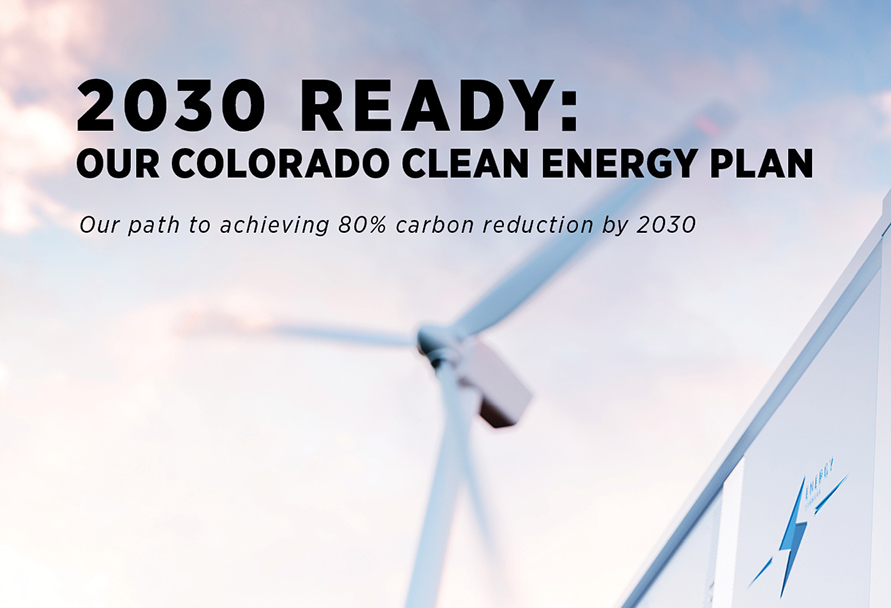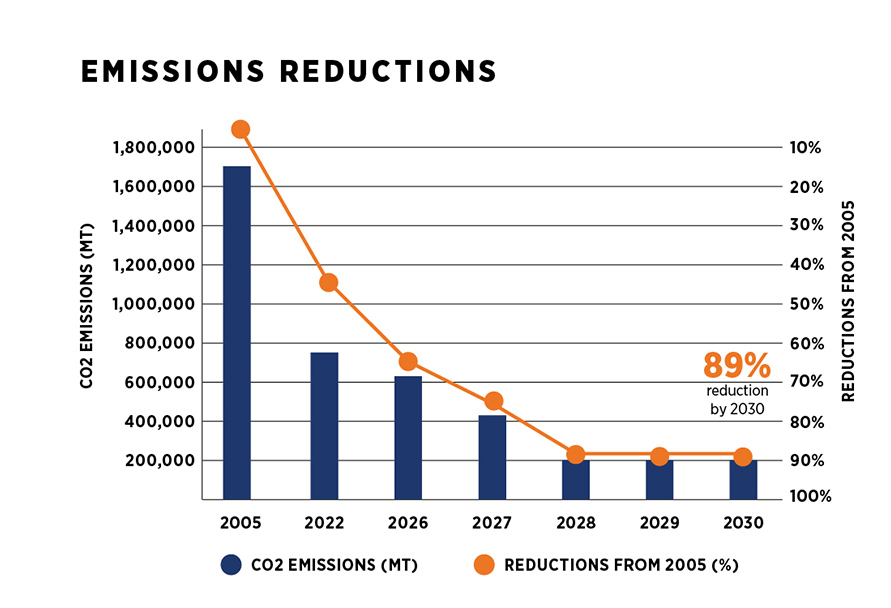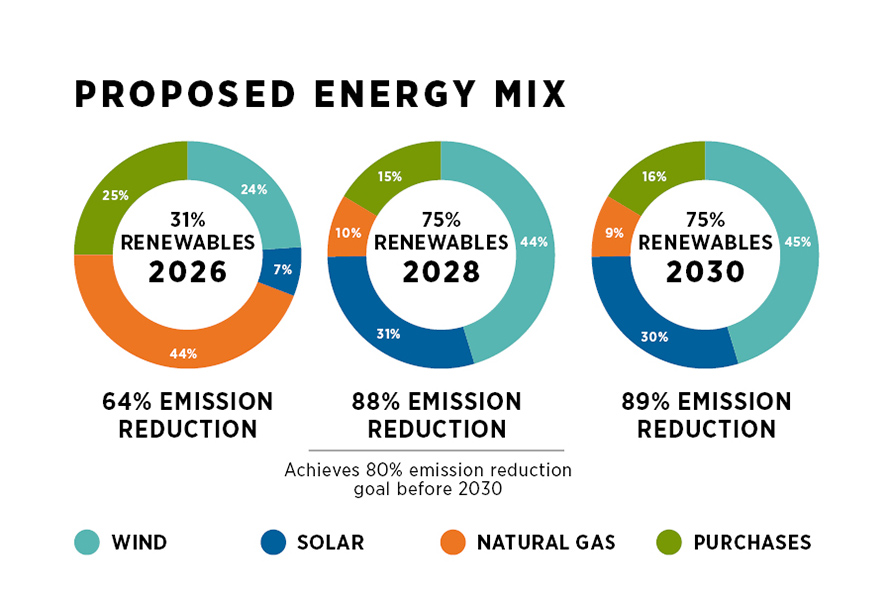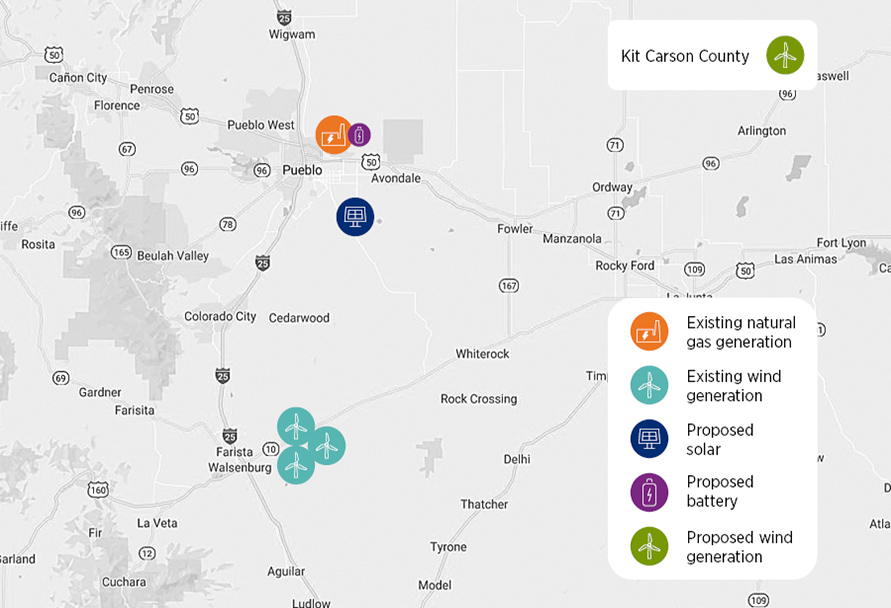2030 Clean Energy Plan advances with proposed addition of 400 MW renewable energy resources

Black Hills Energy plans to advance its 2030 Ready Clean Energy Plan with 400 megawatts (MW) of new renewable energy resources, including utility-scale solar and battery storage projects to be constructed in Pueblo County, and a wind energy project in northeastern Colorado. This preferred portfolio of resources is identified in the company’s Clean Energy Plan 120-Day report submitted with the Colorado Public Utilities Commission (PUC) for review and approval.
The 120-Day Report proposes resources to cost-effectively achieve an estimated reduction in greenhouse gas emissions of 89% by 2030, adding 200 MW of utility-scale solar, 150 MW of wind energy, and 50 MW of battery storage, supported by the company’s existing, dispatchable generation assets. With approval, these resources are planned to be in service by the end of 2027.

With the approved addition of these resources, the company will meet the state’s reduction target of 80% by 2030. The projects are planned to be in service by the end of 2027, creating hundreds of jobs during construction.

Portfolio Highlights:
- 200 MW utility scale-solar project to be located in Pueblo County
- 150 MW of wind energy to be procured through a long-term power purchase agreement with a renewable energy developer
- 50 MW battery storage project to be located at the Pueblo Airport Generating Station (PAGS)
- $53 million in local economic impact
- $323 million in total economic impact to Colorado
- $270 million over 10 years in customer cost savings resulting from Inflation Reduction Act (IRA) tax benefits
- 75% renewable energy mix by 2030
- 89% reduction in carbon emissions by 2030

This map represents Black Hills Energy's current generation resources and proposed resources in the Preferred Plan.
“Our most important job is to deliver safe, reliable energy to the Southern Colorado customers and communities who depend on us. We’re pleased to present a Clean Energy Plan that is grounded in this commitment to our customers and builds upon the work we’ve already done to make our power generation among the cleanest in the state. Our phased-in renewable generation and modern natural gas-fired units serve our customers extremely well and position us to achieve the state's emissions reduction goals."
Campbell Hawkins, Vice President of Colorado operations, Black Hills Energy
What is the Clean Energy Plan?
Black Hills Energy is seeking approval to advance its 2030 Ready: Clean Energy Plan to cost-effectively achieve the state of Colorado’s greenhouse gas emissions reduction target of at least 80% by 2030. In its 120-Day Report filed with the Colorado Public Utilities Commission on April 17, 2024, Black Hills Energy details the results of a competitive solicitation process for the procurement of 400 megawatts (MW) of new renewable energy resources needed to meet the state’s policy requirements. Through careful consideration and planning, Black Hills Energy is proposing a preferred portfolio of resources to meet the state’s clean energy objectives while also presenting back-up options.
What factors were considered in the planning process?
During a competitive solicitation conducted in late 2023, Black Hills Energy received more than 100 bids from developers for the renewable energy resource procurement. With the oversight of a third-party evaluator, the company completed extensive modeling and analysis of each bid to fully assess the value of each project. Considerations were given to reliability, cost-effectiveness of resources, bill impact to customers, environmental benefits, state and local economic impact, and geographic diversity, among others.
How will Black Hills Energy achieve the state’s emissions reduction target?
Black Hills Energy is proposing a preferred portfolio of renewable energy resources which include 200 MW of utility-scale solar, 150 MW of wind, and 50 MW of battery storage. Together, these resources will cost-effectively achieve an estimated reduction of 89% by 2030. This plan achieves the state’s reduction target of 80% by 2030.
What percentage of renewable energy will be on your system in 2030?
If approved, we anticipate our Ready 2030 Plan will meet 75% of our customers' electricity needs through renewable energy in 2030.
Where will the renewable energy come from?
All three proposed projects in our preferred portfolio are located in Colorado, with two projects located in Pueblo County.
When will the new renewable energy be placed into service?
If approved, these resources are planned to be in service by the end of 2027, and together, will achieve the state’s reduction target of 80% by 2030.
Will all this renewable energy on your system affect system reliability?
No. Our ability to serve our customers with 75% of their power supplied by renewable energy by 2030 is possible in large part due to the flexibility provided by the Pueblo Airport Generating Station, also known as PAGS. The power supplied by PAGS, our modern, highly efficient natural gas-fired generating station, is critical to this effort. Because of the intermittent nature of renewable energy-based generation – meaning, the wind doesn’t always blow, and the sun doesn’t always shine - we must have a consistent source of generation available to be dispatched at all times. PAGS is the most efficient means of maintaining reliable service to our customers, 24x7.
Does your 2030 Ready Plan signal a change in the way you operate your electric utility in Colorado?
Not at all. Leadership in emissions reduction is nothing new for Black Hills Energy in Colorado – we retired our last Colorado coal plant in 2013, becoming the first electric utility fleet in the state to move away from coal. Over the past nine years, we have replaced emission-intensive coal plants with lower emission natural gas generation and renewable generation while maintaining system safety and reliability. Our 2030 Ready Plan is built upon years of phased-in renewable generation developments that have resulted in our energy supply being one of the cleanest in the state, powered 100% by natural gas and renewable energy. Because we have already transitioned a significant portion of our fleet to low-emission resources, we do not need to retire large portions of our generation resources, like other utilities are required to do. However, we are proposing to retire all three of our diesel generating facilities by 2030.
Will the Clean Energy Plan impact customers' bills?
If approved, Black Hills Energy will add the Clean Energy Plan Rider (CEPR) to customer bills beginning Jan. 1, 2025. This surcharge will equate to 1.5% of the total annual bill or about $1.50 per month for the average residential customer. The surcharge is needed to help pay for the capital investments and related expenses associated with the implementation of a Clean Energy Plan and is allowed by Colorado state statute.
To offset the new monthly Clean Energy Plan Rider, the company proposes to reduce the monthly Renewable Energy Standard Adjustment (RESA) rider, from 2% to 1.5%. As more renewable energy is added to the system, the company will generate less electricity from natural gas-fired generating units. This will lead to fuel cost savings to customers through a lower Energy Cost Adjustment (ECA).
Additional Information
Read our Clean Energy Plan (PDF Document).
Find additional information on the Local Release (PDF document).
View Black Hills Energy’s 120-Day Report, Proceeding No. 22A-0230E at Public Utilities Commission (state.co.us)